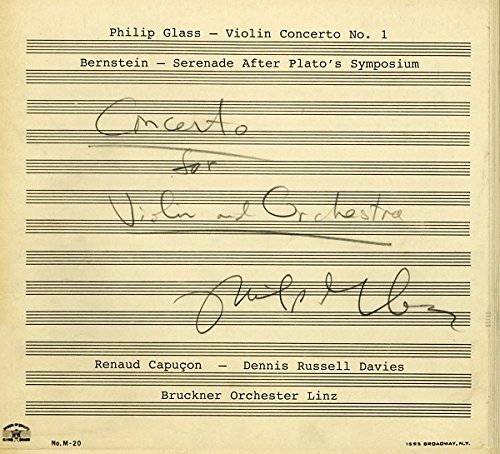GLASS Violin Concerto BERNSTEIN Serenade after Plato’s Symposium
View record and artist detailsRecord and Artist Details
Composer or Director: Philip Glass, Leonard Bernstein
Genre:
Orchestral
Label: Orange Mountain Music
Magazine Review Date: 05/2017
Media Format: CD or Download
Media Runtime: 64
Mastering:
DDD
Catalogue Number: OMM0114

Tracks:
| Composition | Artist Credit |
|---|---|
| Concerto for Violin and Orchestra |
Philip Glass, Composer
Dennis Russell Davies, Conductor Linz Bruckner Orchestra Philip Glass, Composer Renaud Capuçon, Violin |
| Serenade |
Leonard Bernstein, Composer
Dennis Russell Davies, Conductor Leonard Bernstein, Composer Linz Bruckner Orchestra |
Author: Pwyll ap Siôn
Unlike Glass, whose prolific output has been the result of a life dedicated primarily to composition, Bernstein divided his time between conducting and composing. His Serenade After Plato’s Symposium, composed in 1954, displays all the hallmarks of a composer intimately familiar not only with the orchestra’s light and shade, colours and textures, but also keenly aware of the delicate and fine-grained balance required between soloist and orchestra for a concerto to function effectively.
Based on Plato’s philosophical text, which presents different responses by seven Greek philosophers to the question ‘what is the nature of true love?’, Bernstein’s five-movement design also adopts the format of a dramatic dialogue. The first movement contrasts Phaedrus’s passionate opening remarks on love’s creative and destructive potential with Pausanias’s more playful treatment of the subject. Each philosophical approach is given a different musical character, from Eryximachus’s energetic claims that love is omniscient to Socrates and Alcibiades’ extended discussions on the physical and cerebral forms of beauty that close the work. Violinist Renaud Capuçon’s brilliantly judged performance is highly responsive to the work’s musical and philosophical nuances and especially powerful in conveying the emotional intensity of the fourth movement (‘Agathon’).
The same cannot be said about the Glass concerto. Richard Guérin’s booklet-notes refer to a remark made by the conductor Dennis Russell Davies that, in composing the concerto, the challenge of balancing a large orchestra with solo violin proved difficult for Glass. This may be true; but the composer cannot be blamed for the violin’s lack of presence and penetration in the first movement. To be sure, Capuçon’s violin soars high above a descending chaconne bass in the slow middle movement, creating a beautifully glowing sonic halo. However, a rather limp final movement lacks the drive and sharpness of Gidon Kremer’s impressive recording with Christoph von Dohnányi and the Vienna Philharmonic.
Discover the world's largest classical music catalogue with Presto Music.

Gramophone Digital Club
- Digital Edition
- Digital Archive
- Reviews Database
- Full website access
From £8.75 / month
Subscribe
Gramophone Full Club
- Print Edition
- Digital Edition
- Digital Archive
- Reviews Database
- Full website access
From £11.00 / month
Subscribe
If you are a library, university or other organisation that would be interested in an institutional subscription to Gramophone please click here for further information.




